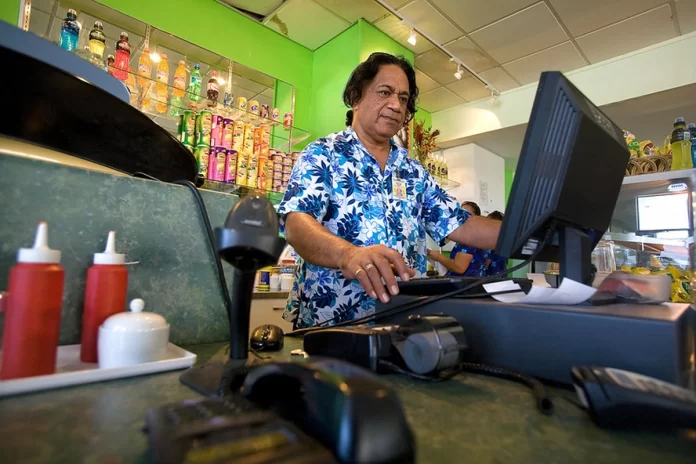By Lotte Schou-Zibell, Regional Director of the Asian Development Bank’s Pacific Liaison and Coordination Office in Australia.
The risk of “de-risking” – the process of international banks disassociating from financial partners, such as small remittance providers and local banks – is that it could push people out of the financial system completely.
In the Pacific, where many countries are just starting to build financial infrastructure, local banks depend on formal relationships with international banks to send and receive international payments.
These correspondent banking relationships—by facilitating trade, foreign investment, and remittances—are a lifeline for businesses and humanitarian organisations, fostering financial inclusion for millions by making accounts available to send and receive remittances.
The relationships—in which one financial institution (the correspondent) provides another a deposit account or other services (the respondent)—allow a flow of finance vital to countries’ economic prosperity.
Yet, today, Pacific island banks and remittance providers struggle to retain these crucial banking relationships amid “de-risking”: international banks terminating or restricting commercial relationships with partners they deem risky. These include remittance companies and smaller local banks in some regions.
Over the past decade, international correspondent bank relationships have declined about one-fifth worldwide and continue to fall. The decline in correspondent banking relationships in the Pacific is broadly in line with global averages over this period. However, this masks the disproportionate effect on small Pacific island countries.
While correspondent banks connect Pacific island countries to the global financial system, they also expose Pacific island countries to risks such as money laundering, which demand additional regulatory responses.
These risks emerge even though the correspondent banks undertake their due diligence when performing transactions for respondent banks and track those risk management and compliance efforts. Respondent banks, in turn, are responsible for normal transaction oversight, including filing suspicious activity reports.
The capacity to accomplish such reports, nonetheless, is often lacking.
The factors driving de-risking include a combination of cost/benefit considerations as well as concerns regarding anti-money laundering and countering the financing of terrorism (AML/CFT)
Stricter regulatory and enforcement since the global financial crisis has tightened anti-money laundering regulations, increased tax transparency, and applied more effective economic and trade sanctions to detect and deter criminal activity and reduce the chance and costs of future systemic financial crises.
These tighter rules require correspondent banks to ensure they comply with international guidelines or legal and regulatory frameworks, including know-your-customer (KYC) rules. Banks also now need to hold larger capital buffers to draw on during economic downturns.
These stricter regulations have led correspondent banks and financial institutions to re-evaluate their risk appetite when transacting with jurisdictions that may lack robust implementation and enforcement, such as the Pacific islands.
A steady increase in compliance costs and rising fines and penalties imposed for non-compliance has driven this ‘de-risking’. Western Union, for example, spends over US$200 million a year on risk and compliance, with 20 percent of its employee base dedicated solely to this function.
Many correspondent banks have found that profits from remittance transactions do not compensate for their high compliance costs and the risks of non-compliance. By de-risking and ceasing to transact with respondent banks, these financial institutions have reduced their exposure to fines and penalties, decreased compliance costs, and minimized reputational risk.
Multiple studies have shown that the risk of money laundering and terrorism financing in the Pacific is low.
Ironically, the stricter regulatory and enforcement landscape developed to ensure financial stability increasingly excludes valid customers from formal finance and forces them to look at informal systems.
Rather than reducing risk in the global financial sector, the continuing decline in correspondent bank relationships could harm regional and international financial integration, financial inclusion, financial transparency, and thus economic growth and poverty reduction.
This is doubly ironic in the Pacific Islands. Multiple studies have shown that the risk of money laundering and terrorism financing in the Pacific is low.
If the correspondent banking network gets even smaller, it would reduce competition and likely erase years of progress in reducing remittance costs and fees. In addition, scarce options and higher fees could force remitters to use riskier, less regulated such as informal networks or cryptocurrency.
This would increase financial system risk, particularly given that the latter often lack proper cybersecurity, basic risk management, legal certainty, or consumer protection. This risks further isolating vulnerable communities, particularly women, from the formal financial sector, with wide-ranging humanitarian, economic, and security implications.
Addressing de-risking will require collaborative work among development partners, governments, technology providers, and service providers to help Pacific Island countries adopt practices to rebuild and maintain correspondent banking relationships. Here are four ways to get started:
A scalable, risk-based application of anti-money laundering regulation is required. In meeting requirements, financial institutions can ensure stringent regulation is not imposed on remittance providers that generate many but lower-value and lower risk transactions and typically do not threaten financial stability.
A risk-based approach would apply lower compliance requirements for smaller, lower-risk institutions by using risk assessment that increases compliance requirements with the likelihood of criminal activity. This would use resources more effectively; minimize compliance costs and burdens on customers; and boost flexibility to respond to emerging risks.
Create or modernize identity verification systems and update legislative and regulatory environments for affordable and automated financial authentication and authorization. Identification is key to safe financial transactions, and accurate ID verification is required for account opening and financial inclusion.
Biometrics, blockchain, artificial intelligence, machine learning, and big data offer potential solutions to create digital legal identities, delivering trust, security, and privacy for citizens and saving millions for public and private sectors.
Increase awareness of anti-money laundering requirements and strengthen remittance operators in low-capacity jurisdictions. Some banks in Pacific Island countries have financial and digital literacy programs that could be the basis for training on sending and receiving remittances. Such training can also be linked to the seasonal employer labor mobility programs in Australia and New Zealand.
Help countries develop know-your-customer technology and processes that benefit compliant organisations and boost consumer confidence in the privacy of personal information. Several jurisdictions have developed, or are developing, robust know-your-customer and customer due diligence platforms to standardise information sharing between banks and between banks and regulators. This reduces due diligence costs and enables better enforcement.
India, for instance, has developed a digital identity platform that enables paper-free know-your-customer procedures, reducing the costs of adding new customers and easing compliance with regulations. And the Central Bank of Samoa, with ADB support, is developing a web-based platform to verify the identity of remittance senders and receivers. It checks against sanctions, politically exposed persons lists, and other due diligence measures.
The decline of correspondent banking results from multiple causes, and no single action will reverse this trend. We need a comprehensive and coherent approach to de-risking that consolidates international efforts through targeted action and a consistent voice.
Sally R. Shute-Trembath
Senior External Relations Officer
Pacific Liaison and Coordination Office in Sydney, Australia
Asian Development Bank
Tel +61 2 8270-9444
SOURCE: ADB/PACNEWS

















